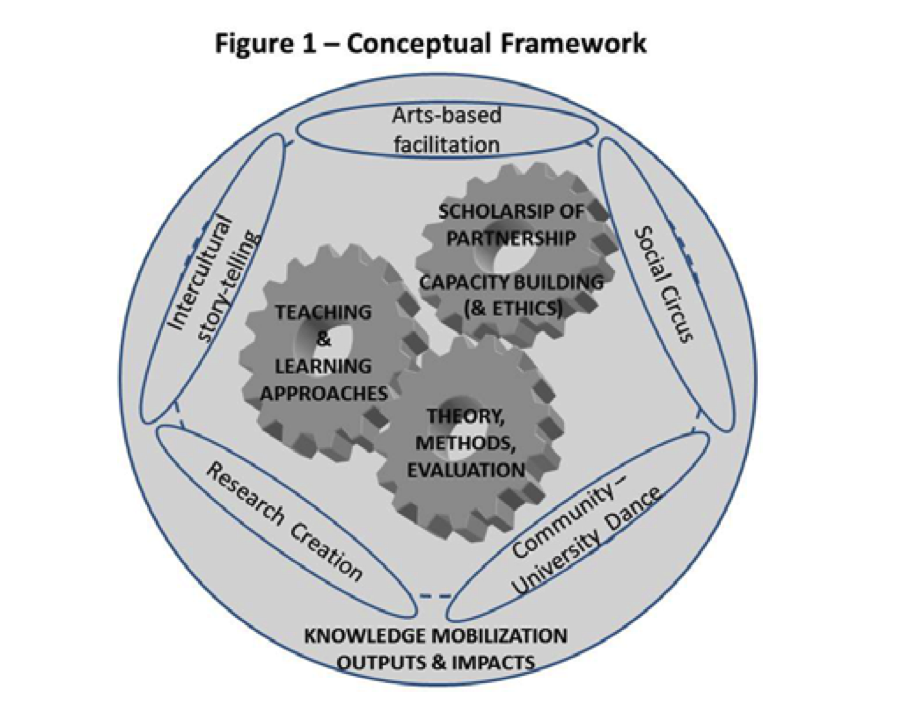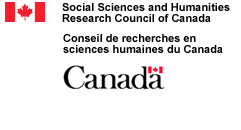Dates:
2013-2018
Funded by:
Social Sciences and Humanities Research Council (SSHRC)
 Partner Organizations
Partner Organizations
- Simon Fraser University (SFU): Host Organization
- Arts Network for Children and Youth
- Ashoka Canada
- Canadian Centre for Policy Alternatives
- Calgary Arts Development
- Cirque du Monde (du Soleil)
- Concordia University
- Decidedly Jazz Dance Works
- Judith Marcuse Projects (JMP)
- University of Calgary
- University of Lethbridge
- University of Toronto (UofT)
Lead Researchers
- Judith Marcuse, Project Director, SFU
- Katherine Boydell, Co-Investigator, UofT
- Lisa Doolittle, Co-Investigator, University of Lethbridge,
- Lynn Fels, Co-Investigator, SFU
- Anne Flynn, Co-Investigator, University of Calgary
- Jennifer Spiegel, Post-Docotral Fellow, Concordia
- Rachael Van Fossen, Co-Investigator, Concordia
- Annalee Yassi, Co-Investigator, UBC
Website
http://art-for-social-change.ca/
Project Description
ASC refers to the broad spectrum of ways in which the arts are used to engage people and encourage positive change. The research program involves the participation of community members, students and change makers from a wide variety of sectors, including the health and justice systems; civil society, environmental, intercultural, elder and youth-focused organizations; and professionals working in the fields of social innovation, social enterprise and public policy. Five field study projects involving arts-based dialogue, performing, visual arts and social circus, as well as the creation of a learning institute, will enrich both research and the resources to be created. On-line videos, publications, public gatherings, exhibitions and performances will contribute to the work of ASC practitioners while bringing knowledge of this potent and effective form of change work to a wider public.
Purpose: to develop, implement, and evaluate transferable arts based facilitation processes with diverse community members across professional, disciplinary and cultural silos to inquire and address concerns of common interest.
In a three-year series of arts-based facilitated workshops in Vancouver, Calgary and Lethbridge, we will investigate the use of arts-based facilitation processes in social innovation initiatives. This Field Study will be informed by the pilot Chataqua Project, recently undertaken by JMP, a year-long process that provided evidence of the positive impact of art-based facilitation to advance possibilities for the development of partnerships and collaboration. This field study will provide data on effective ways to develop relationships, understandings and insights through arts-based facilitation that nurture new collaborations and enrich possibilities for positive change. Judith Marcuse Projects (JMP), SFU, Ashoka, The Canadian Centre for Policy Alternatives, McConnell Foundation and Vancity will be key Partners in this field study.
Purpose: to link research creation and public performance more fully with social activism through partnership engaging universities with community-based and/or ASC organizations.
“Encounters” is a research creation project led by artist scholar Rachael Van Fossen. Building on two earlier projects, an ensemble of artists and students from a wide variety of cultural backgrounds, life experiences, and faiths will, through a series of workshops in both undergraduate and community settings, share persona stories and, through the act of performing another person across vastly different life experiences, build a performance. Community collaborators advising research and participants will include grassroots organizations promoting intercultural exchange and social equality across differences of racialization, immigration, gender, sexuality, age and other common marked and unmarked differences. This process provides an example of the utility of performance tools to build intercultural communication, and investigates aesthetic experience as a means to ‘understand’ and know difference and commonality. Data from this field study will inform researchers on good practices for meaningful social engagement between university students, artists, and community organizations; and provide insights o partner capacity building, evaluation, and knowledge exchange. The data generated will contribute to adaptable ASC processes and tools to continue a sustainable methodology in ASC intercultural and intergenerational communication into the future. This research draws on relevant discourses and practices in intercultural performance, and will build upon existing theorizing of engaged aesthetics. Partner Concordia University will collaborate with ASC organizations including Herencias, Teesri Duniya Theatre, and the MAI (Montreal, arts interculturels).
Purpose: examines the effectiveness of engaging in the arts through dance in creating a sense of community and in the reframing of personal identity in two community-based, programs, one of them in collaboration with a university.
In the first, program participants are residents of subsidized housing complexes for senior citizens (largely first generation immigrants to Canada with varying degrees of English language proficiency), and students/recent graduates. In the second, participants have been diagnosed with Parkinson’s disease. Through the use of arts based inquiry, we will research the process of knowledge transmission from a research-intensive university to the local community involving faculty members and students working off campus and interacting with diverse populations. This university-community partnership will be used as a research laboratory led by Anne Flynn and Lisa Doolittle to study the impact of dance classes on populations of immigrant seniors, in order to evaluate the effectiveness of engaging in the arts, such as dance, in creating a sense of community; develop more research focused evaluation tools; and identify effective strategies regarding program design, operation and management. Partners are Decidedly Jazz Danceworks, the Alex Seniors Health Centre (exact title from Anne) and Universities of Calgary and Lethbridge.
